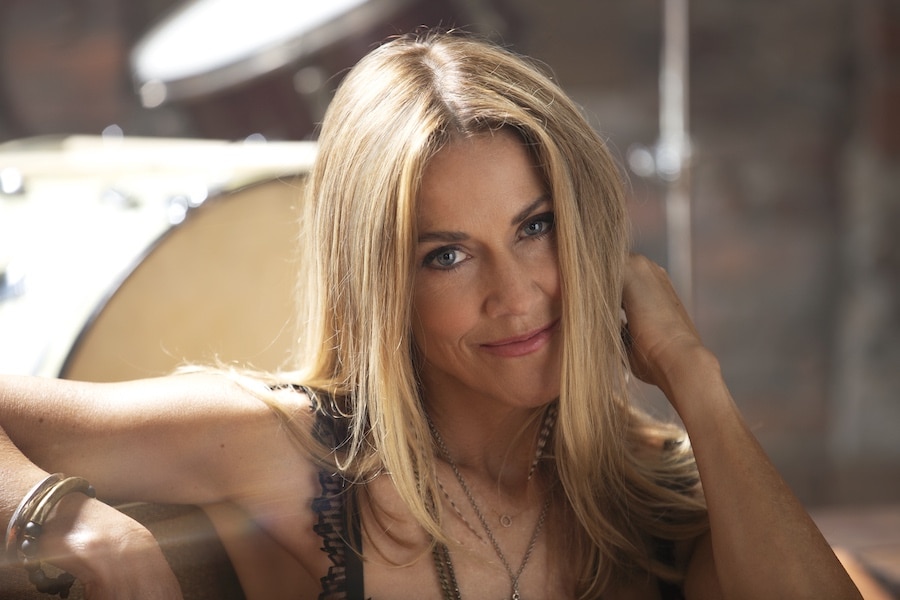
The word “influence” gets tossed around liberally in music writing, so much so that the true spirit of the word — one of collaboration, homage and respect — can get muddied. Iconic names like Bob Dylan or the Beatles litter press releases announcing debut artists, often with little regard to if or how said artists’ legacies connect. On Sheryl Crow’s latest album Threads, though, the beloved songwriter traces her own influences with care and deliberation, showing in 17 songs just how critical influences are to keeping quality, meaningful music alive.
Videos by American Songwriter
Threads follows Crow’s 2017 album Be Myself and finds the revered songwriter, now 57, collaborating with a who’s-who of artists, including veterans like Stevie Nicks, Mavis Staples and Emmylou Harris as well as younger artists like Maren Morris, Jason Isbell and St. Vincent.
Crow’s own influence on today’s songwriters can’t be overstated. Her 1993 debut album Tuesday Night Music Club is regarded as a classic of the form, while songs like “All I Wanna Do,” “Everyday Is A Winding Road” and “Strong Enough” are sure to endure for many more decades to come.
Despite her accolades, Crow speaks. She also still does her own chores. “I’m making my bed and doing laundry while I’m talking to you,” Sheryl Crow tells American Songwriter, calling from her home in Nashville. “Just keeping it real.”
Crow first envisioned Threads while recording with Kris Kristofferson after the pair appeared together on a 40th anniversary celebration of Austin City Limits. She calls Kristofferson “a profound influence on [her] as a songwriter” and names her time in the studio with him as inspiring her to consider the many other artists who have shaped her artistry and legacy.

“[Kristofferson] is one of the great American songwriters,” she says. “I think they’ve been pretty public about the fact that he’s not making memories. It really affected me, after working with him, that in the 25 years that I’ve been doing what I’m doing, or 30 years, how fortunate I’ve been to work with so many of my heroes. Just in reflecting on that I asked him if we would come in and record with me in my studio and he did and that became the impetus of the record, just creating moments out of gratitude for the people that inspired me to do what I’m doing.”
The word “gratitude” comes up a lot across our conversation, both in Crow’s describing the making of Threads and in her reflecting upon her decades-long career, which, thus far, has netted her nine Grammy Awards and more than 50 million albums sold worldwide. (Longtime fans of Crow’s won’t be surprised by her focus on gratitude. Consider her 2002 C’mon, C’mon hit “Soak Up The Sun,” for example, which contains the koan-like lyric, “It’s not having what you want but wanting what you’ve got.”)
After recording his 1972 song “Border Lord” with Kristofferson, Crow reached out to Nicks to see if she would be interested in a similar session. The collaborations began to snowball from there and Threads began slowly to take shape.
“It just grew over time. It was not a big idea in mind to make a full album,” Crow explains. “But it just kept going and so many incredible experiences were captured on tape. I wrote with people in mind and hoped that they would say yes, and here we are three-and-a-half years later.”
That Crow could write for such a diverse roster beloved artists is just one testament to the depth, care and humanity of her songwriting. She wrote “Live Wire” with Mavis Staples and Bonnie Raitt in mind, having grown up idolizing and singing along to both artists before becoming their contemporary later in her career.
In liner notes for Threads, Crow writes, “Mavis Staples means so much more to me than any words I could write about her. She has been there for some of the most important American social events of the past 60 years, fighting with her music and her voice to try to make things get better for all people. No song can hold the depth of this woman … I feel like, in many ways, Mavis is the Godmother to Bonnie Raitt. Bonnie has as much soul in her little finger as many great singers could ever hope conjure in their whole life’s work.”
“With this record, I tried to write songs that I felt like wouldn’t be something that would put someone on the spot,” she says of “Live Wire.” “You’re not going to send Mavis Staples a song that is so totally out of character. But the great thing about it is, a lot of these people have been such big influences for me I could feel authentically what I felt like was a good in-between for us, particularly with Mavis and Bonnie, certainly with Stevie. So it just came together.”
Crow also finds connections between living legends and the new generation of young songwriters, a phenomenon that gave the album its title. On Threads’ opening track “Prove You Wrong,” she pairs Nicks and Morris so seamlessly it seems predestined. Margo Price joins Crow and Neil Young on “Cross Creek Road,” a standout track named after Crow’s Nashville farm.
“I had the great fortune of working with a lot of these young artists on the Outlaw Tour,” she explains. “I’m sure middle-aged people feel this way when their kids start listening to pop radio and you’re like, ‘Why are you listening to that crap?’, you know. I found myself being so enthused and hopeful about the future of music by seeing these incredible artists that don’t get played at radio. It made me feel great about things. I wanted to honor that, as well. These artists like Margo and Jason Isbell and certainly Chris Stapleton, who’s one of my best songwriting buddies, and Gary Clark and Maren — they all, I think, are carrying on the tradition of great songwriting, truth-telling, they’re interested in connecting with their audiences in a less calculated way than social media.

“Just to watch them grow makes me, as a mom of two kids, feel good about the music scene knowing that there’s always room for everything but this tradition still does live on. It really stems from the people who have influenced me like James Taylor and the Stones and Willie Nelson and Emmylou and some of the people on this record. I find that there are threads all through my music that I could trace through a lot of the music that I’m hearing come out of some of these young artists that are carrying on that tradition.”
Younger artists Gary Clark Jr. and Andra Day find harmony alongside Crow and hip-hop legend Chuck D on “The Story Of Everything,” a track that also showcases Crow’s sonic versatility and encapsulates Threads’ multi-generational, genre-defying approach to collaboration. “I’ve known Chuck D since our early days at Rock the Vote,” she says. “He’s been a friend and ally to me and he’s also one of the great, outspoken American poets and truth-tellers of his generation.
“Gary is young now but a few years ago I met him when I was doing the 100 Miles From Memphis tour. He’s special. He’s different. He’s unique. Then Andra — she is a fully realized artist. She is who she is. Like Willie Nelson says, ‘When Willie walks out on stage, everybody knows who they’re gonna get.’ With her, she’s very authentic. Having her was essential.”
That particular track was inspired by a conversation Crow had with her brother — a homebuilder — during the 2016 presidential election. The two discussed how the number of people seeking part-time construction work had declined in recent years because, as Crow’s brother sees it, wages are so low that many people can live more stable, comfortable lives through public welfare programs than they can by working.
“That’s what’s happening in these small towns,” she says. “It’s disheartening. That’s where the song came from, and just watching how so many of our old, white Congresspeople were so adamantly against anything positive from Obama. That really, to me, represents ingrained bigotry that wasn’t being addressed. Now it’s being addressed because we have a president who’s an overt bigot. It wasn’t being addressed at the time. I’m sure I’m going to piss people off saying that but I think history will document correctly what we’re going through now. We’re too divided right now to understand.”
While she wrote most of the tracks on Threads herself, Crow also included carefully chosen covers of a handful of songs that are especially meaningful to her. One of those is a stirring take on George Harrison’s All Things Must Pass track “Beware Of Darkness,” which Crow reimagined alongside the eclectic trio of Sting, Eric Clapton and Brandi Carlile, the latter of whom Crow has watched grow as an artist since Carlile released her self-titled debut album in 2005. Crow, Clapton and Carlile conjure Harrison’s “greedy leaders” and “hopelessness … in the dead of night” with aching vocal harmonies as Clapton does his best Slowhand-joins-the-Beatles, making for a true statement piece on an album already chock full of them.
“There were instances, like ‘Beware Of Darkness,’ where I just wanted to do that song because it was calling to me. If George were here, I would have wanted to collaborate with him. And I can’t think of a song that is more important right now than that, and perhaps ‘Redemption Day.’
“Redemption Day” is indeed the centerpiece of Threads, and perhaps its most poignant moment. Crow wrote the song for her 1996 album Sheryl Crow after visiting Bosnia alongside Hillary Clinton and felt “Redemption Day,” with its condemnations of war and hatred, still held great relevancy today. The new version found on Threads features vocals from Johnny Cash’s cover of the song (appearing on 2010’s American VI: Ain’t No Grave), which he recorded in the studio with Rick Rubin shortly before his death in 2003.
Cash’s son John Carter Cash granted Crow rights to use that recording, with Crow debuting the track and announcing her new album at an event at the family’s Cash Cabin Studio in mid-April.
“I knew the song from her album when she put it out,” Cash says. “But it didn’t occur to me that it would be the right kind of thing for Dad to be involved in … Dad was still in the studio working on those Rick Rubin records, and the way those records were done, Dad had the freedom to do what he wanted. It was his therapy. It was his life’s blood.”
The younger Cash was in the studio the day Johnny recorded “Redemption Day,” saying the elder Cash “always loved the song.” “It was something that always stuck in my head,” he says. “Years down the line, after Dad had passed away, Sheryl wanted to perform it live with Dad’s vocal track … The live performance I thought was powerful. It was amazing that suddenly his voice was there.”
Crow later reached out to Cash about what would become the Threads version of “Redemption Day,” and he says he was “honored to be part of it.”
“The final version just blew me away,” he says. “When I saw the video I immediately thought, ‘This is overwhelming. It hurts to watch this.’ Then I thought to myself, ‘That’s the point.’ There are a lot of things in this world that are uncomfortable to look at and people forget … I think it’s a song that needs to be heard and paid attention to. And that’s my father’s philosophy … The truth is not always comfortable.”
The music video for “Redemption Day” shows actual footage from events like the Holocaust, the Civil Rights Movement and the Vietnam War, the powerful, often violent imagery paired with lyrics like, “How I weep for those who’ve gone into rooms of grief and questioned wrong but keep on killing / It’s in the soul to feel such things, but weak to watch without speaking.”
“Sheryl is a good person,” Cash says. “She has a spirit that reminds me of my father. She’s dealt with physical struggles and my Dad did too and he only got stronger because of it, so there’s parallels with Sheryl in that, too. I appreciate her as a human being, a songwriter and a higher mind of poetry and music.”
The song is only one of several tracks on Threads that allude to current social and political events. Crow has a long history of activism and speaking out about injustice and didn’t think twice about.
“There is great liberation in being my age,” she says. “I can safely say that I’m not competing with anybody for pop radio space because I’m not going to get played there. For people that are my age, the things that I’m writing about are the things that we’re all thinking about. As far as irking anybody with my message about the state of our political dialogue, as a songwriter I have to take the stance of observer and commentator without thinking about it that much or thinking about who’s going to be pissed off.
“I know at the end of the day I’m going to get ‘shut up and sing’ no matter what I say. That’s just the nature of social media now. It’s the old me even more to write the truth when I know that that’s who you’re up against: people who are constantly clogging the lines of truth. And those people aren’t going to like my music anyway. They’ve already decided who I am and they’re not going to like it, because it’s me.”
Just as Crow is hopeful in the new generation of songwriters, she is also optimistic about how young people will tackle some of today’s larger societal ills, particularly climate change. Performing at this year’s Glastonbury festival, she dedicated “Soak Up The Sun” to Greta Thunberg, a young climate activist from Sweden who has captured the world’s attention with her clear-eyed visions of our dire need to address climate change.
“It’s humbling and it’s shaming,” she says of watching the new generation of activists. “Our children shouldn’t be worrying about these extremely scary topics, like what’s going to happen to their world. Our children should be living a childlike, innocent youth. They shouldn’t have to be telling the adults, ‘Please, please acknowledge that what you are doing will affect the world we inherit.’ And it’s inspiring and it’s extremely shaming. I can’t even think about it without being so overwhelmingly emotional. Because these are my kids. They’re everyone’s kids. Some of these old people in our government who have been there forever and enjoy making money have no skin in the game.”
When Crow first publicly hinted at Threads in 2018, she told WFPK’s Kyle Meredith that it would be her last full-length project. When asked what’s next on her radar, she tells American Songwriter that she looks forward to spending more time with her two sons and hopes that Threads can chart a path for a new generation of artists.
“At the end of the day, that’s what music is,” she says. “It’s the exchange of emotion and it’s the connecting of souls. Every time I collaborate with someone I wind up with something I didn’t really expect. It’s always mind-blowing.”







